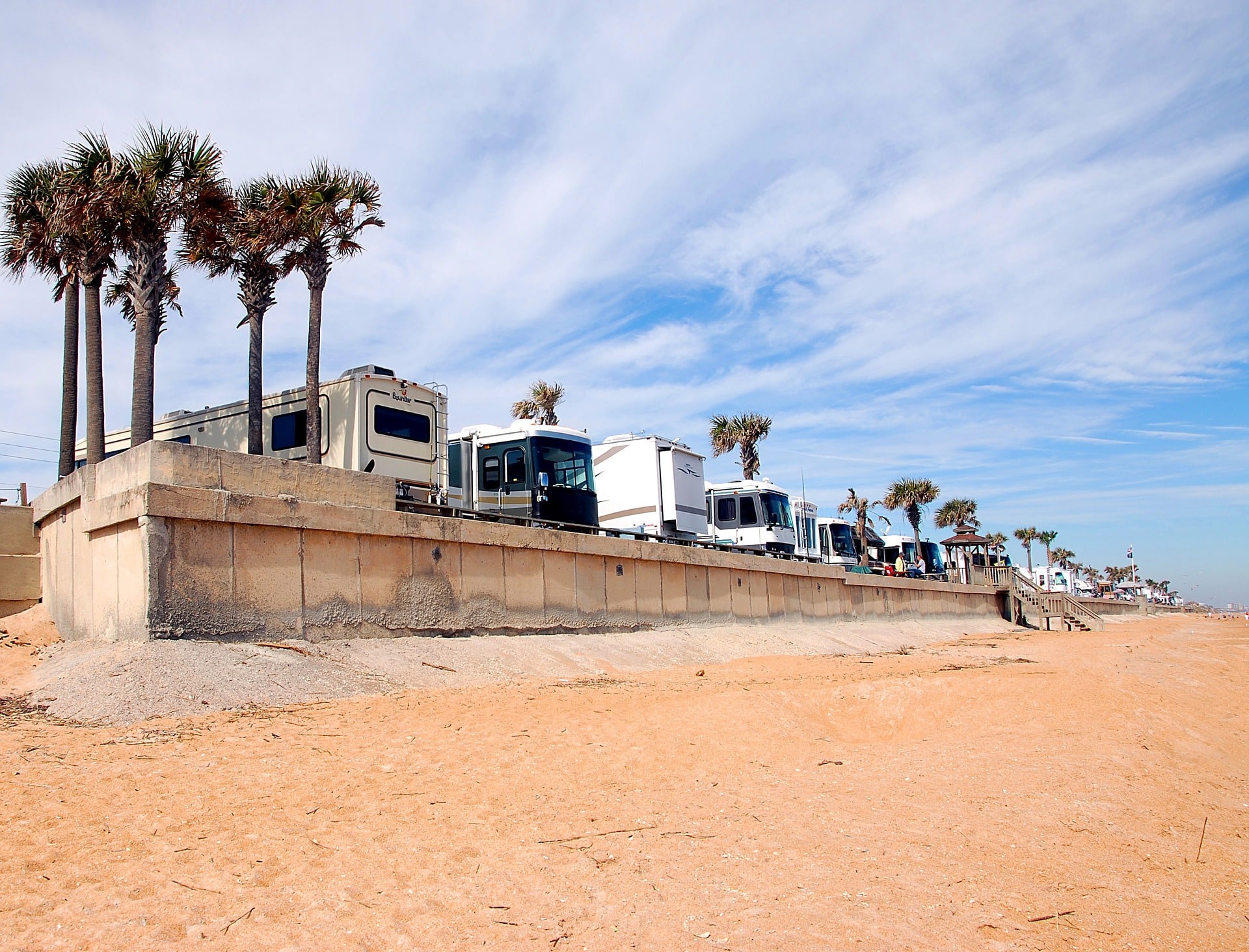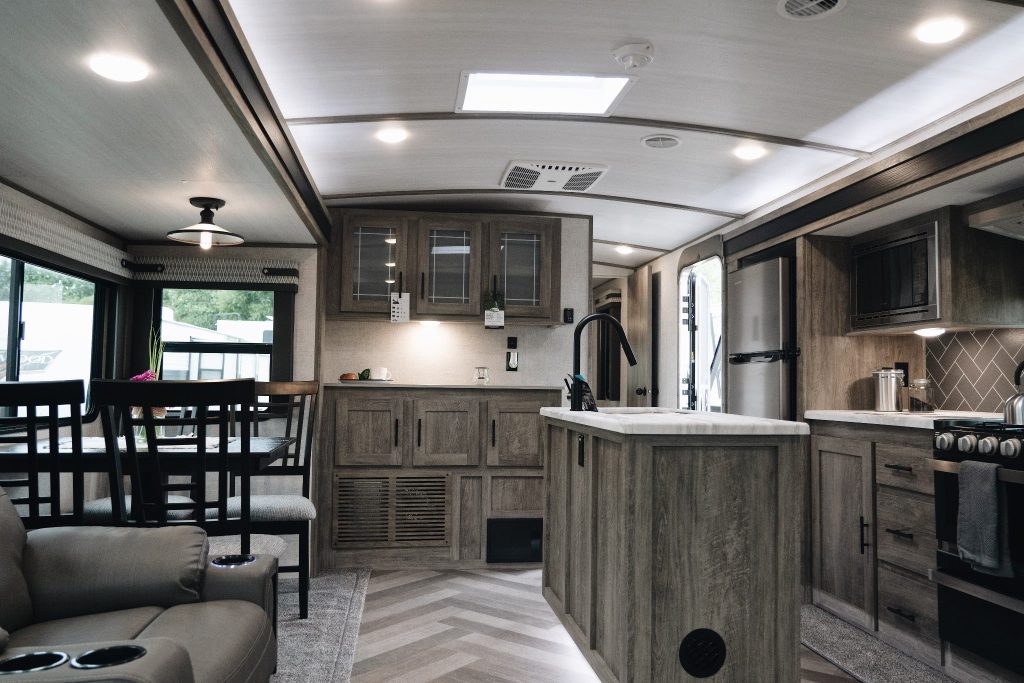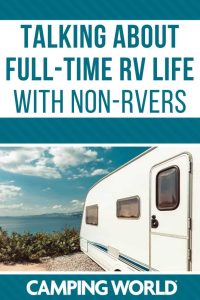I hear it all the time. When it comes to full-timing RV living, people say things like, “People actually do that?!” The answer? Yep, and they love it. Thousands of people live full-time in their RV, but when I discuss full-time RVing with people who don’t RV at all, they think of it as something that’s weird or often somehow unacceptable.
It’s just a different mindset. Many of these people have no idea what modern RV life can be like or how homey modern RVs actually are.
What’s funny to me is that many people would actually be happier if they lived in an RV, or at least it seems that way. I know a lot of people who want to simplify their life and see the country. Full-timing is a great way to do that. However, if I were to bring up full-time RV living to them, they would scoff and write off my suggestion as silly or absurd.
So, I’ve found that you need to approach these conversations in a certain way. Here’s some advice on talking to non-RVers about full-timing.
Make It Clear That Full-Timing Is a Choice
In my experience, the people who don’t understand full-timing often think people live in their RV because they have no choice. They assume there’s a financial reason that’s put them in an RV.
There are some people who do cite affordability as the main reason for living in their RV, but I have yet to meet or talk with someone who has that as their only reason.
So, when discussing full-timing with a non-RVer, you should make it clear that full-time RVing is a choice. It’s a decision you’ve made to help you live your life to the fullest.
Tell them your reasons for full-time RVing. The number one that I hear is that people want to see the country. They want to explore and chase experiences instead of possessions. Yes, a more affordable lifestyle can be had RVing, but you can also live lavishly if you want to. Honestly, it’s pretty easy to spend more money living in an RV that you would in a house, so the idea that it’s automatically cheaper is deeply flawed.
Full-timing is about having the ultimate freedom and complete control over your life. It’s a choice you make to not be tied down to a specific place. If you can get them to understand that, then you’ve made the first step towards getting them to understand the full-time RV lifestyle.
Tell and Show Them How Awesome Modern RVs are
A lot of people who don’t RV have an outdated idea of what the inside of an RV is like. They often assume RV interiors are cheap, cramped, and uncomfortable. I’ll admit that there are still some RVs out there that fit this description, but for the most part, modern RVs are very home-like.
With modern materials, residential-style furniture, slide-outs, and modern appliances come RVs that are as comfortable and convenient as a typical home.
Tell skeptics that. Even if they believe you, take things a little further. Whip out your smartphone and show them pictures of your home on wheels. If you don’t have pictures of your own RV, pull up the manufacturer’s website and show the person or people you’re talking to what they can expect from a modern RV. You’ll often surprise some folks.
Discuss The Advantages of Full-Time RVing
Similar to talking about the fact that full-time RVing is a choice, I would also urge you to discuss the advantages of full-time RVing. First and foremost is the freedom. So many people want to travel but can’t because of the fact that they have to stay close to the house they purchased.
With an RV, you take your home with you. While this isn’t for everyone, in the right context, it can make life thoroughly enjoyable. You can travel almost all of the U.S. and go out of the country if you want in your RV. Traveling and having new experiences is the number one advantage I can think of.
It’s also a simpler life. Many people end up with tons of stuff when they have a house. Not all those possessions will make them happy. Some things might, but I’ve found that too much stuff in your house is often just a source of a lot of stress. The smaller living space of an RV means you get to downsize your life and live simpler. Living this way doesn’t mean you go without things. It just means you better manage your life and the things in it.
You can also discuss the financial benefits if you want. However, make it clear that it’s all about how you manage your money. You can easily spend more money living in an RV than you would if you just owned a home. Affordable RV living is certainly possible and most full-times do save money, but it’s not necessarily like you’ll be socking away cash all the time.
Also, don’t let them think money is the only or main reason for choosing the RV lifestyle as already discussed above. It is a notable advantage over a typical home, but not the sole reason. You can point out all of the differences between living in and paying for a house and living in and paying for an RV.
First and foremost talk about the fact that it’s often easier to pay off an RV than it is a house. RVs simply cost less. Also, insurance is very affordable. Maintenance fees and the cost to upgrade are often less than you’ll spend on a home. You do have fuel and sewer fees, but homes have to pay for electricity, natural gas, and sewer service, too. RV’s win the war here, too. If you live smart RV living is very affordable.
Sure, you’ll have to pay for campgrounds, but there are also plenty of ways to find free or reduced-cost campgrounds or camping areas. For example, a Good Sam membership will get you camping discounts on campgrounds across the country. Also, BLM land is available for free camping and is in some of the most beautiful areas of the country.
By talking about the advantages, you should help them understand why full-time RVing is a smart way to go for many people.
Address the Misconceptions
There are a lot of misconceptions out there about full-time RVers. One is that they’re vagrants without jobs. I’ve heard this often, and it simply isn’t true. Many full-time RVers have full-time jobs they can do remotely. Many others are business owners. Others get jobs wherever they go. It depends on how a person wants to live their life.
Other times I’ve heard people say things like full-time RVers are just always on vacation. That’s definitely not the case for most. If you’re independently wealthy or retired, you may have a life closer to this, but the fact of the matter is that living in an RV isn’t all that different than living anywhere else. You still have to do laundry, clean your home, and the kids (if you have them) still have school work to do.
Non-RVers often also assume that full-timers are loaners and don’t have many friends. This is 100 percent not true. In my experience, it’s the opposite. Most of the RVers I know or have talked with have more friends than people who live in a typical house. Why? They travel around and meet people and make friends. This can make for a very rich social life.
The bottom line is that many people have an idea of what living in an RV will be like. Most of those initial thoughts are wrong. Be ready to explain why those thoughts are and show the person what it’s really like.
Be Respectful of Their Opinions
Full-time RVing isn’t for everyone. It’s an alternative lifestyle and one that will not work for everyone. Some people get attached to a specific place or have no interest in traveling the country. While that might not be your ideal lifestyle, it certainly is a valid one.
Some people will still think full-timing is crazy even after you explain the benefits to them. That’s okay. It’s not for them. That’s no worry of yours. Respect the choices they’ve made and the way they decide to live their life. You want the same from them right?
If you respect their opinions and make it clear that you understand where they’re coming from but that conventional house isn’t for you, you’re bound to find people will treat you with the same level of respect you would like.
How have similar conversations gone for you? Leave a comment below and share your experiences!













You can make a nice house payment for what a rv resort will cost to rv fulltime. If you like camping and going on road trips great. Keep your house and rv.
We fulltime RVed for 28 years and absolutely love the lifestyle. When we started we had no idea what Fulltiming was; we just wanted to see our country. We had RVed with our kids previously, boating, camping and taking them on vacations so were familiar with RVs but this was exciting. We didn’t know if we would continue for 6 months, a year or…? Each yearly anniversary we would have a two-person “vote” about whether we would continue. And so 28 years passed.
One important point we make to people who ask about fulltiming is that you have to really like your partner because you live in a small space and spend 24/7 with that person! (We also joke that two TV’ s also help-one for sports and one for home channels)
Our choice for fulltiming was to do hosting and volunteering for our space cost, usually for 3 to 6 months. Perfect way to save on expenses but also it gave us more time to get to know a location. We did this all over the country from our home state California to Maine, Alaska, Texas, and places between. Loved it!
We recently moved into a cottage and downsized from a 41′ 5th wheel to a 25′ motorhome so our fulltiming years have finished but we are still out here traveling. Itchy Hitch strikes often.
Hey stop telling people how wonderful it is! Getting too crowded!! Full-time since 2009!
The other thing about living in the RV/Camper life is that you have many options as to various clubs that you can belong to that offer discounts at camp grounds as well as discounts on gas and many other items as well. The other thing that you don’t have to worry about is payment for utilitie bills such as gas,water,electric bill,trash, and yes you have only one bill that you pay and that is the bill for camp grounds because all the other Bill’s are figured into the rental space at the camp grounds. The best part of all of this depends on what part of the country that you are visiting while you are there, for example if you are visiting Wyoming I would be staying there for at least two weeks because there is so much of the mountains, Mount Rushmore and many other things to see as well.
I wish you could convince my old lady to stay full time. But looks like it wont work out again.
I thought this was a very good article. We ourselves will be doing the RVing thing this year. It was good to hear that more and more people are starting to understand the RVing thing. I am more interested in hearing about how that it may not be cheaper than owning a house. Is there somethings that we should be aware of as we travel? Thanks
I thought that this was a very good article about both sides of RV/Camper living life on the go to many different ways you can visit this great country of ours. I’m currently starting to live the RV life because I’m a Vietnam Era Veteran who is currently changing my life for the better and get healthier at a new VA medical center which I couldn’t get at the one in my hometown and I enjoy being able to travel about this great country of ours.
Not really true. If you stay at RV RESORTS you’ll almost alway pay a LOT more. If you stay at a NON rv resort on a monthly rate you’ll pay way less. Sometimes $100s to over a $1000 per month. We are at a very nice NON rv resort with full hook ups right now at only $400/pm. Granted, it’s not on a beach or convenient to shopping and restaurants. But it’s quite, and well maintained.
I enjoy traveling in our RV . But my girlfriend doesn’t want to. Makes it tough for me
Thanks, Robert! Glad you found it enjoyable.